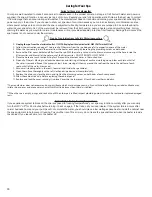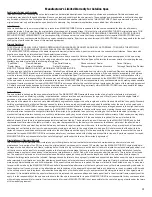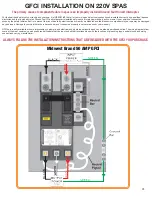
13
Re-Filling your Spa with Water
Follow these step by step instructions every time you re-fill the spa to ensure successful start up. If you need to replace the screws on
the cabinet, use stainless steel screws which do not rust.
THE IMPORTANCE OF GOOD WATER CHEMISTRY
For your health and safety, it is imperative to have clean, clear, water. Water maintenance will vary depending on many things like the
base water quality, how often the spa is used and how many people use the spa. Remember, when it comes to water chemistry, filtration
is not the same as sanitation. Following a regular schedule will help you achieve and maintain good water chemistry. Bacteria and
viruses grow quickly in water when it is not properly maintained. Maintaining your water is necessary not only for proper sanitation, but
preventing buildup and deposits that will harm your spa.
A leading preventable cause of spa malfunction is poor water chemistry.
Too many chemicals will cause the components, acrylic
surface and the spa cover to deteriorate. Not enough sanitation allows impurities to accumulate, which will hinder performance and can
permanently damage the spa. Water can become unsanitary very quickly if chemicals are not used to adequately sanitize. Incorrect pH
or calcium levels can lead to corrosion and scale build up on integral spa components.
The following guidelines have been established for spas by the Association of Pool and Spa Professionals:
pH
7.2 to 7.8
Free Chlorine
3.0 to 4.0 ppm
Free Bromine
2.0 to 4.0 ppm
Total Alkalinity
80 to 120 ppm
Calcium Hardness
150 to 250 ppm
COMMON SENSE WATER CHEMISTRY
Without chemicals, the warm water in your spa is the perfect environment for germs, bacteria and other living organisms. Chemicals
added to your spa water are utilized as they destroy the bacteria from dead skin cells, sweat and other bodily fluids. Routine addition
of sanitizers kept at constant levels keep your water clean and safe to use. Maintaining water chemistry is different in every spa and for
every spa user. Your water chemistry changes constantly. When the water in your spa evaporates, dissolved solids like calcium, salt and
metal remain, they do not evaporate with the water. Adding more water adds more dissolved solids which may leave deposits on the
acrylic surface and inside the spa components. When the cover is off, pollen, dust and dirt change the water chemistry. A spa once a
day will require more chemicals than the same spa filled with water from the same source that’s only used once a week. What it takes to
balance your water chemistry in January will be different in July.
The major considerations in water chemistry are:
• The base water quality
• The number of gallons of water in the spa
• The number of people using the spa
• The number of hours the spa is being used
What’s in your water? The answer is different for just about everyone. Water provided by public utility systems
must meet strict standards requiring chemical treatment before it flows through your faucets. Even though quality
standards are similar regardless of where you live, the treatment required to meet that standard, and the residual
chemicals that remain in your water after treatment can vary greatly. Water flowing from faucets in Washington State
is different than the water flowing from faucets in Oregon, Texas and Florida. Water delivered directly from a well is
untreated and water that passes through a softening system receives an additional treatment. Whether your water is
treated or untreated, filtered or unfiltered, all water delivers trace amounts of something that can negatively affect the
performance of your spa.
Do not
use hot water when you fill your spa.
Do not
use water that has passed through a water softener system.
Using well water is not recommended.
Well water often has higher mineral, metal and bacterial content that will
damage the spa components and makes water chemistry maintenance difficult. If you must use well water to fill your
spa, you should get professional assistance.
If you are having difficulty with your water chemistry
, you should consider having your water tested locally to
determine the appropriate treatment.
Base Water Quality
Maintaining Water Quality









































